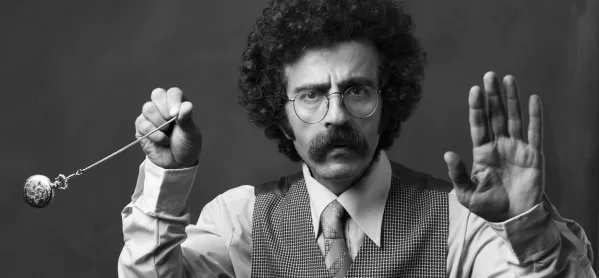
- Home
- Is Williamson right - are we indoctrinating our pupils?
Is Williamson right - are we indoctrinating our pupils?

The case against: This is just another stick to beat teachers with
At such an easy time in schools, it is reassuring to find those at the very top taking a firm line and telling us all to get a grip and do our jobs properly.
There must be no more preaching in schools about a communist revolution. There must be no more laziness. No more teachers too lazy even to preach about a communist revolution. We have all been brought to heel, at last, by the new rule of sticks. (Carrots are still off.)
The latest stick to be wielded, of course, is the one advising us to put a stop to all that undermining of democracy and capitalism. This came in the form of a document published by the Department for Education last week, and presented to the wider world this week, with Gavin Williamson conducting a very winning “fireside chat” with his old politics teacher for the Conservative Party conference.
What teachers are really up to
The minister has plainly seen through the haze of antibacterial spray in classrooms at the moment. He has worked out what we teachers are really up to this term.
At a time when most of us might ostensibly be spending our day trying not to get ill or to make anyone else ill, and repeatedly reminding pupils to keep face coverings on and to hand-sanitise, while we also get on with the day job, he can see what is really going on. Behind my mask and my masquerading, I am, of course, busy undermining democracy and capitalism.
Though I am not as bad as my colleague Ms Lenin, over in maths. For decades, she has been getting away with a constant stream of left-wing preaching. Go past her room and it’s always the same message. “What does x equal, if 3x + 7= 22? No, the answer does not equal 5, Archie. Nothing is equal, nothing is fair. ‘X’ still represents the capitalist exploitation of the proletariat, as it always will until the inevitable revolution.”
Meanwhile, Mr Trotsky over in English is naturally keen to deliver all his lessons live online. This is his big chance to share his revolutionary vision with the world - if only his darn pupils would listen and stop staring out of the window. And if they didn’t all have to plough through Macbeth.
We should also keep a wary eye out for the new geography NQT, Miss Mao, who seems to be ignoring the scheme of work entirely. Instead, we overhear much communal singing about peasants.
Lazy, irresponsible and manipulative?
The decision to crack down on anti-capitalism follows the government recently passing emergency legislation to make sure that heads are getting their teachers to work hard enough - whether offline in the classroom, online in Google Classroom, or sometimes when doing both at the same time. Which, in turn, followed Gavin’s equally helpful announcement a couple of weeks ago that there was too much laziness from too many teachers during lockdown.
Let’s hope that the new law means that police and members of the armed services can be brought in to manhandle any teacher who is a little slow in opening up the laptop and logging on. Finally, there will be a uniformed figure of authority who can tell teachers to get on to Google Classroom or go to jail. Again, not before time.
Ofsted, too, has rightly continued to raise the stick at schools, rather than raising a finger to help. Instead of falling into the obvious trap of making our job even easier by rolling up its sleeves and offering to come in and help teach, it, quite rightly, insists instead on just coming in, adding a bit of much-needed pressure and feeding back to parents.
With so much sensitive and informed external support for teachers and schools, it is a shame that teachers on the floor do not bother to respond in kind and show more gratitude.
In fact, I know many colleagues who are utterly oblivious to all these positive contributions from the top. They just look up wearily from their desk and mutter some nonsense about “never having a moment” to follow the news.
Lazy, irresponsible and manipulative. Those are the words that sum us all up. Or - just maybe - sum up the people behind these ridiculous measures.
Stephen Petty is head of humanities at Lord Williams’s School in Thame, Oxfordshire

The case in favour: Why are we only teaching pupils certain views?

“Racist! You should be ashamed of yourself! You’re lost!”
These comments are filled with venom. I can picture the words spurting out of frothing mouths as the Facebook users type furiously at the keyboard, their weapon of choice.
Two hundred replies, all rage-filled. This skinhead Nazi sympathiser must have beads of sweat popping out of his forehead swastika tattoo by now, surely.
The only problem is that I know this person being accused of racism. I also know some of the people commenting. He’s not a Nazi sympathiser, there’s no swastika, and he’s not even white.
So what inspired the all-out attack?
Committing the ultimate sin
He’s a black American man, a prominent figure in self-help communities with a well-known book that documents his highly abusive childhood. His upbringing was like a horror story, filled with trauma. Fortunately, he managed to escape the ghetto and turn his life around. After a long journey, he was appointed to the highly respected position of master chief in the United States Navy.
Sheer grit, effort and determination paved the way to his present situation. Now he spends his life giving back, helping children to understand their situation and giving them a message of hope.
So how did he come to be the recipient of so many online attacks?
He committed the ultimate sin: he went against popular opinion. He dared to provide a logical and reasonable argument against a popular movement. He wrote under a Black Lives Matter social media post that the social issues in their community - his community - aren’t a matter of skin colour, but of culture. He also offered some very reasonable and rational arguments to support his case.
Of all people, he is someone we should listen to, but he is silenced through the threat of being branded any one of a list of unthinking names and titles.
A cowardly route to easy lessons
I look to our school PowerPoints dealing with this topic, and a quick internet search reveals that a large number of people’s viewpoints are not represented.
This is becoming more common. We are given lessons to teach, but we aren’t presenting all the views that create a balanced opinion. It seems the opinions presented are the “popular” ones. Or perhaps it’s more a case of the opinions of least resistance.
I can’t help but feel that this is a cowardly route to easy lessons. It makes me feel uneasy, like we are betraying our purpose as educators. After all, shouldn’t we be creating students who can take a wide variety of opinions, empathise with where they come from, syphon through them, and then help them to form their own balanced, rational views through analytical and critical thinking? Isn’t this what teachers ought to be doing?
Education secretary Gavin Williamson certainly thinks so. He told the Conservative Party conference: “It’s important we give pupils the context in order for them to be able to learn and form their own opinions. They should not be influenced in an improper way.”
Is this possible when students are shown only certain views?
Searching outside our comfort zone
Recently, during tutor time, I was expected to deliver a 20-minute session comparing the rise of Donald Trump to the rise of Adolf Hitler.
This is a popular opinion on social media: there are loads of comparison videos, and they are effective. I should point out that one of my teaching units specialises in advertising and persuasion, so I understand the field - these guys are good. So why aren’t educators asking who made them?
Now, I’m no Trump fan. But, like him or not, he was democratically elected by the majority of the country. If I delivered the PowerPoint, wouldn’t students logically deduce that Trump supporters are Nazi sympathisers? How is little Cindy at the back of the classroom supposed to feel, when she knows full well that her parents think Trump isn’t too bad? I mean, he’s Hitler, right?
I’m in the same boat as the rest of you, influenced by the media and internet algorithms more than any of us would like to admit. In the past, to get a book published you actually had to have credentials. Today there is a study backing up every viewpoint, and these can easily be manipulated.
But it’s a boat, not a sinking ship. It just takes a little more work. We may have to analyse the information we are given a little more thoroughly. We may have to search a little further outside our comfort zone. We all have a duty to provide all the rational arguments available on all sides.
A final point to ponder over. The counterpoint view to that of a black person in a tough community who supports BLM isn’t from a white person who is a member of the KKK, or any other such stereotype: it is from a black person in a tough community who doesn’t support BLM.
We need to get out of a skewed way of thinking, which martyrs some and demonises others. We need to lose the black-and-white mindset, and start looking towards the grey areas a little bit more.
It is within these grey areas that compromise and balance exist. It is here that students can grow and develop their own views, without fear of judgement.
Sam Weller is assistant progress leader and a design and technology teacher at a secondary school in Northamptonshire
Register with Tes and you can read five free articles every month, plus you'll have access to our range of award-winning newsletters.
Keep reading for just £4.90 per month
You've reached your limit of free articles this month. Subscribe for £4.90 per month for three months and get:
- Unlimited access to all Tes magazine content
- Exclusive subscriber-only stories
- Award-winning email newsletters
You've reached your limit of free articles this month. Subscribe for £4.90 per month for three months and get:
- Unlimited access to all Tes magazine content
- Exclusive subscriber-only stories
- Award-winning email newsletters